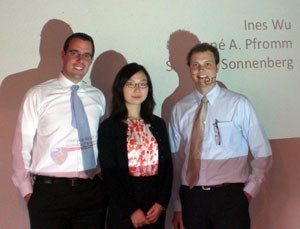On May 16th, two HLS students, René A. Pfromm LL.M. ’08 and Ines Wu ’09, together with Stephan Sonnenberg ’06, Harvard Negotiation and Mediation Program (HNMCP) clinical fellow and lecturer on law, delivered a one day workshop on negotiation in the context of genocide and mass atrocities. The workshop, part of a two-week program for government officials, was conducted at the Raphael Lemkin Seminar on Genocide Prevention in Auschwitz, Poland.
“This was not an easy project,” said Sonnenberg, who assisted in delivering the training. “Responding to the question of whether to negotiate with killers and perpetrators of genocide, especially in a location as moving as Auschwitz, challenged our students to explore both the limits and the promise of negotiation as a tool for addressing conflict.”
The May training was the culmination of a semester-long negotiation clinical project for the Auschwitz Institute for Peace and Reconciliation (AIPR) in which Pfromm and Wu were tasked with developing a curriculum to address both the possibility and ethical limits of using interest-based negotiation in the face of possible or continuing genocide.
“I really enjoyed the challenge of developing and delivering the negotiation training to a group of such experienced practitioners, knowing that it might have an impact on their future negotiations,” said Pfromm. “Our clinical supervisors helped us tremendously in mastering the challenge, and prepared us well to be instructors for mid-level diplomats.”
The curriculum introduced participants to the basics of interest-based negotiation and addressed the complicated ethical and tactical questions that negotiating in the face of evil presents. It also explored how tools of negotiation could be used as a way to prevent violence before it begins.
“This is the kind of high-impact and challenging project to which we want to expose students in our clinic,” said Robert C. Bordone ‘97, HLS assistant clinical professor and director of HNMCP. “I’m grateful for the opportunity and trust provided by AIPR and am hopeful that the diplomats will be able to deploy some of the tools we shared in their future work on the ground.”
Supported by the United Nations and the U.S. and the Polish governments, the workshop was the first of its kind. The long-term aim of the program is to create a growing community of government officials from around the world who are prepared to recognize and respond rapidly and effectively to situations of genocide or other mass atrocities.
